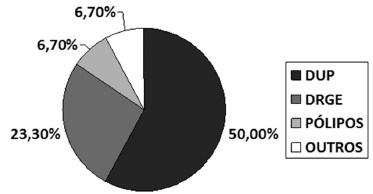Background:
Obesity has become epidemic, and is associated with greater morbidity and mortality. Treatment is multidisciplinary. Surgical treatment is a consistent resource in severe obesity. The indication of preoperative upper gastrointestinal endoscopy in asymptomatic patients is controversial; however, most studies recommend its implementation in all patients.
Aim:
To analyze endoscopic performance in patients who were in preoperative for bariatric surgery and compare them with control group.
Method:
A series of 35 obese patients in preoperative period for bariatric surgery compared with a control group of 30 patients submitted to upper endoscopy. There were analyzed clinical and endoscopic data.
Results:
The mean age of the group of patients was 43.54 years. Most individuals in the group of patients were female with median BMI of 47.26kg/m2and in control group 24.21 kg/m2. The majority of patients were asymptomatic. Upper endoscopy was altered in 81.25% of asymptomatic patients. Endoscopic findings in the patient group were 57.1% resulting from peptic ulcer disease and 34.3% associated with GERD. The analysis of endoscopic findings in patients showed no significant difference in relation of the control group. The prevalence of H. pylori infection was 60% in patients.
Conclusion:
It is recommended that the upper endoscopy should be made in all patients in the preoperative bariatric surgery period, although the degree of obesity is not related to a greater number of endoscopic findings. Obese patients do not have more endoscopic findings that non-obese individuals.
Obesity; Bariatric surgery; Endoscopy

 DUP= ulceropeptic disease; DRGE=reflux disease
DUP= ulceropeptic disease; DRGE=reflux disease
 DUP= ulceropeptic disease; DRGE=reflux disease
DUP= ulceropeptic disease; DRGE=reflux disease